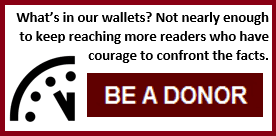Russia’s latest provocations: Business as usual?
By Lawrence J. Korb, Katherine Blakeley | December 9, 2014

Mock bombing runs by Russian planes over Denmark. A mystery Russian submarine mere miles from Stockholm. Russian bombers off the coast of California, and Russian submarines in the Caribbean. Russian fighter jets flying dark over the Gulf of Finland and buzzing Norwegian planes. An Estonian counterintelligence officer disappearing near the Russian border under suspicious circumstances. Is this a New Cold War?
According to NATO’s secretary general, Jens Stoltenberg, Russian air activity has increased all over Europe. NATO jets have been scrambled more than 400 times this year, a 50 percent increase over last year. In the Baltics, Russia’s activity has increased dramatically, with over 100 intercepts by the Baltic air policing missions this year—a three-fold increase. In addition to the air activity, Russia has conducted larger exercises near the Baltic states, and increased the number of deployed strategic nuclear weapons.
But this is not the Cold War redux. Russia is not an existential threat to the United States or NATO the way the Soviet Union was. Despite Putin’s claim that he intends to restore Russia’s great power status, Russia is not a superpower now, nor will it be a superpower in the near future.
However, Western-Russian relations have been turned on their head since the Russian invasion and annexation of Crimea in March and the continued Russian military presence and support for the separatists in eastern Ukraine. Far from being the hoped-for constructive world citizen that was invited to partner with NATO through the unique NATO-Russia Council, Russia has taken actions that have destabilized Ukraine, alarmed the Baltics, and shaken the complacency of NATO and the European Union.
The best explanation for these dramatic and provocative military actions is actually two explanations. First, Putin wants to restore Russian dominance and influence in the territories of the former Soviet Union, keeping Western influence further from Russia’s borders. Second, Putin wants to blunt Western responses by keeping the West distracted and destabilized. A paralyzed Europe, wondering what Russia will do next, is less able to act in concert to enforce or expand economic sanctions. Pressing worries about the security of NATO members—or Sweden and Finland—refocus attention away from Russia’s continued intervention in eastern Ukraine. While Putin’s next step is unknown, each day that passes makes a permanent ‘frozen conflict’ in eastern Ukraine more likely.
Putin’s views dominate Russian policy, and his views are broadly shared among the Russian elite. As noted Russia expert Strobe Talbott has pointed out, over the quarter-century since Gorbachev came to power, there have been a significant number of high-level national security officials in Russia who favored retrenchment over democratization in domestic politics, competition rather than cooperation with the world in foreign policy, and disinformation over glasnost (literally, the Russian word for “open-ness”). These reactionary forces were sidelined in the Gorbachev and Yeltsin era, but Putin has embraced their views, all the more firmly after he returned to power for the second time. Therefore, to see recent Russian behavior as coming from Putin’s worldview alone would be a mistake. Russia’s revanchist tendencies are unlikely to disappear suddenly.
The more important test is how the United States and its European allies respond to what may be an enduring fracture in Europe.
The smart response. The sanctions imposed by the United States and the EU are having a real impact on the Russian economy. The Russian finance minister has estimated that these will cost Russia about $40 billion this year. These sanctions, plus the fall of world oil prices, have led to a 40 percent decline in the value of the ruble against the dollar since the annexation of Crimea, while domestic inflation has reached 10 percent. It may be hyperbolic to say that Russia is “a gas station masquerading as a country,” in the memorable words of Sen. John McCain, but there is no doubt that Russia is deeply dependent on now-slumping oil and gas prices for government revenue and capital flows.
As one commentator noted, the greatest danger facing Russia now is the Russian economy. Russia’s economy will be in recession next year, shrinking by about 3 percent, instead of the paltry 1.2 percent growth projected before the sanctions took effect. Russia’s fragile economy is forcing Putin to reduce government spending, including a planned military buildup. Major—and greatly-needed—infrastructure projects have already gotten the axe. Although Putin said that the project would be built in Turkey instead, Putin recently scrapped plans for the South Stream megaproject, an ambitious $19 billion natural gas pipeline for Russian gas through southern Europe. Putin has also closed 28 hospitals and laid off tens of thousands of medical workers.
The real issue is whether our European allies will be willing to keep economic sanctions in place for an extended period. The sanctions hurt the European economies far more than the United States, and Putin is weakening support for the sanctions among the countries with the closest economic ties to Russia. However, there is no doubt that Putin’s continued military provocations make the EU sanctions more likely to hold.
The second component of the United States’ strategy is a revitalized NATO. Until Putin’s aggression in Ukraine, NATO was institutionally moribund. Members of the alliance are now not only increasing their defense spending but are in the process of building up a brigade-sized rapid-reaction force of 2,000 to 3,000 troops. In another dramatic shift, NATO is also conducting large-scale exercises on the territory of its central European members. Another key component of the NATO response is increased attention to counter-intelligence efforts, particularly in countries that were part of the Soviet Union. NATO must also prepare for the possibility of a hybrid conflict spearheaded by Russian irregulars or deniable special force troops. In all areas, NATO is bolstering its capability to respond quickly and forcefully if Putin should be foolish enough to invade a NATO member country.
Third, the United States, the European Union, and other European countries should not let Putin’s showy provocations distract them from Russia’s continued occupation of Crimea and deep support of the rebels in eastern Ukraine—without which the rebels would almost certainly have been unable to hold their ground against the Ukrainian Army. The United States and the EU should continue to provide Ukraine with financial and technical assistance, such as additional loan guarantees.
Finally, the West must keep the door open to working with Russia where possible, rather than severing ties entirely. While Russia has announced that it will not be participating in the 2016 nuclear security summit and has deployed more strategic nuclear weapons, it is still complying with the limits set by New START. Russia’s offer to reprocess spent nuclear fuel from Iran would net Russia lucrative fees but also significantly advance the prospects of a permanent agreement between Iran and the P5+1 (China, France, the United Kingdom, the United States, Russia, and Germany). Russia also continues to share counterterrorism intelligence with the United States.
In his state of the nation address, Putin claimed in an angry, aggrieved tone that he would not back down in the face of Western sanctions. However, if Putin continues on his current path, his regime, like that of the Soviet Union, is liable to collapse under its own weight within a couple of years. In the meantime, the United States and its European allies must continue to improve NATO’s rapid response capabilities and hold firm with the sanctions. Time is on the West's side.
Together, we make the world safer.
The Bulletin elevates expert voices above the noise. But as an independent nonprofit organization, our operations depend on the support of readers like you. Help us continue to deliver quality journalism that holds leaders accountable. Your support of our work at any level is important. In return, we promise our coverage will be understandable, influential, vigilant, solution-oriented, and fair-minded. Together we can make a difference.
Topics: Nuclear Weapons, Opinion















